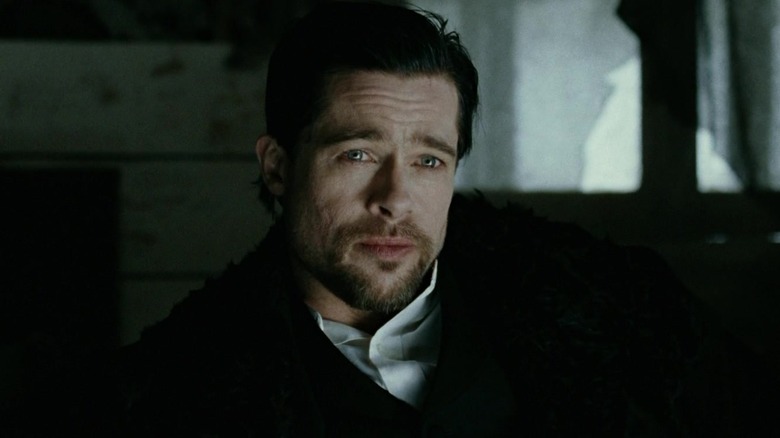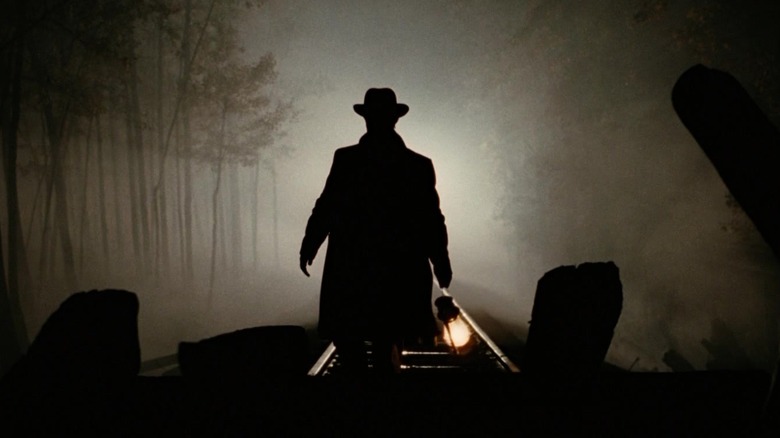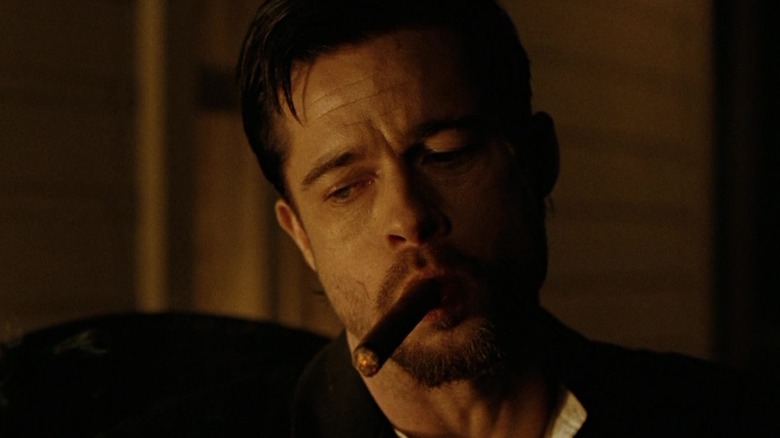A Brad Pitt Western Flop Is One Of The Best Movies Of The 2000s
There was a time when the Western was every bit as popular as the superhero movies of today. Well, perhaps not of today, considering Marvel should arguably allow the Marvel Cinematic Universe to die. But Western films have been integral to the history of cinema since the silent era, becoming a reliably popular genre throughout the first half of the 20th century before diminishing in the latter half. Even then, however, we still got some outstanding efforts as the 20th century drew to a close, and even the last decade has seen some great Westerns released.
Of course, as the genre persisted, it transmogrified. Westerns began by telling simple stories of good vs evil only to morph into the kind of revisionist fare we've seen in more recent decades. These more complex takes on the genre subvert well-established tropes and standards in order to re-evaluate Westerns and the often real-life stories on which they're based. Such was the case with 2007's "The Assassination of Jesse James by the Coward Robert Ford," a film that didn't make much of a commercial impact but which is arguably one of the best modern Westerns ever made, and easily one of the best examples of the genre to be released in the 21st century.
The movie was based on Ron Hansen's 1983 novel of the same name, and was written and directed by Andrew Dominik, who'd previously overseen the Eric Bana-starring "Chopper" in 2000. Dominik is also responsible for the horrifying ugly dream that was the 2022 Marilyn Monroe biopic "Blonde." While that might seem like the farthest you could possibly get from a Western, "Blonde" actually shares a central theme with "The Assassination of Jesse James" in that it focuses on the nature of celebrity and the public's fascination with larger-than-life figures. In fact, both films deconstruct the very idea of celebrity, which, in the case of Dominik's Western, makes for a haunting and reflective film that deserves to enjoy a much better legacy than it does today.
The Assassination of Jesse James is a powerful meditation on celebrity culture
If you're going to make a film about celebrity worship, what better actor to cast in the lead role than Brad Pitt? Arguably the epitome of the modern Hollywood star, Pitt was given the part of the titular outlaw in "The Assassination of Jesse James." But the story itself focuses more closely on Casey Affleck's Robert Ford, an aspiring outlaw himself who is enamored by James. Ford's older brother, Charley (Sam Rockwell), is already associated with James, and after being recruited by his idol, Robert does his best to succeed as part of the outlaw gang, taking every opportunity he can to tell James of his own admiration for him.
As things progress, however, Ford slowly realizes that his idol isn't the mythic figure he'd thought. At one point, after hearing how closely Ford has followed the many tales of James' exploits, Pitt's character tells his new recruit, "They're all lies, you know." This delivers a dose of bathos to undermine not only Fords' adoration for James, but in a wider sense our own fascination with celebrities, celebrity culture, and the concept of hero worship. After Ford becomes disabused of his love for James, he plots to kill his former idol, which (as the title sort of spoils) he eventually does ... only to realize that his actions have only furthered James' standing as a mythic American hero.
Aside from being one of the best Brad Pitt movies, "The Assassination of Jesse James by the Coward Robert Ford" is easily one of the best films to arrive in the early 2000s, delivering an elegiac mediation on not just the Western genre and its history of telling oversimplified hero-vs-villain stories, but on our own proclivity for hero worship and the pitfalls therein. Sadly, nobody really saw the film in theaters. But its poor box office performance is really the only negative point about what is otherwise an outstanding film.
The Assassination of Jesse James didn't deserve to be as big as flop as it was
Debuting in September 2007, "The Assassination of Jesse James by the Coward Robert Ford" was already doomed before it hit theaters. Evidently, Warner Bros. thought "The Assassination of Jesse James" was going to be a shoot-em-up. Why? That remains unclear, as the film hews closely to the book and the finished product doesn't deviate from Andrew Dominik's script. But Warners was expecting a different film, and execs were dismayed when Dominik delivered his mournful revisionist Western with haunting visual imagery courtesy of acclaimed cinematographer Roger Deakins.
A report from the Los Angeles Times noted how the director "wanted to deliver a dark, contemplative examination of fame and infamy, in the spirit of director Terrence Malick." But when Dominik screened his film for Warner Bros. execs, they were less than impressed with its gloomy tone and lengthy run time. According to Hugh Ross, who served as both the film's narrator and first assistant editor, two execs left the theater and were overheard outside joking about how "what we really need is more shots of slow-moving clouds."
As a result, "Jesse James" was dumped in five theaters, bringing in $147,812 opening weekend before expanding to 301 screens. This resulted in a total box office take of $15.3 million worldwide. Considering the movie had a $30 million budget, that's a flop by any measure. But "flop" really only applies to the film's commercial performance. Its 77% score on Rotten Tomatoes doesn't really convey the respect "The Assassination of Jesse James" commands among Western fans and critics today. Not only were reviewers highly complimentary of Dominik's film upon its debut, the film earned two Oscar nominations — Casey Affleck for Best Supporting Actor and Roger Deakins for cinematography. Lamentably, none of this could save "The Assassination of Jesse James" from being quickly overlooked. Thankfully, the years since have seen the film praised as one of the best movies of its era, and time will continue to be kind to this oft-ignored classic.


